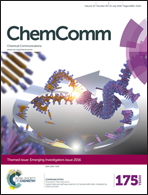Organic nanophotonic materials: the relationship between excited-state processes and photonic performances
Abstract
Nanophotonics have recently captured broad attention because of their great potential in information processing and communication, which may allow rates and bandwidth beyond what is feasible in the realm of electronics. Organic materials could be well suitable for such applications due to their ability to generate, transmit, modulate and detect light in their lightweight and flexible nanoarchitectures. Their distinct nanophotonic properties strongly depend on their extrinsic morphologies and intrinsic molecular excited-state processes. In this feature article, we mainly focus on a comprehensive understanding of the relationship between molecular excited-state processes and the advanced photonic functionalities of organic micro/nano-crystals in recent organic nanophotonic research, and then expect to provide enlightenment for the design and development of tiny photonic devices with broadband tunable properties by tailoring the excited-state processes of organic microcrystals.

- This article is part of the themed collections: Celebrating the ChemComm Emerging Investigator Lectureship Winners and 2016 Emerging Investigators

 Please wait while we load your content...
Please wait while we load your content...